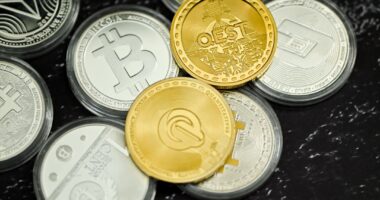NFTs, or non-fungible tokens, have taken the digital world by storm, revolutionizing the way we buy, sell, and trade digital assets. In the gaming industry, NFTs have opened up a world of possibilities for game developers and players alike. NFTs are unique digital assets that are stored on a blockchain, making them one-of-a-kind and irreplaceable. This technology has allowed game developers to create rare in-game items, characters, and even entire game worlds that can be bought, sold, and traded on the blockchain. This has added a new layer of value and ownership to digital gaming, as players can now truly own their in-game assets and even make a profit from them.
Game development has always been a complex and competitive field, but NFTs have added a new dimension to the industry. With the ability to create and sell unique in-game items, game developers now have the opportunity to monetize their creations in ways that were previously impossible. This has led to a surge in interest in NFT game development, as developers seek to capitalize on this new market and create innovative gaming experiences that leverage the power of blockchain technology. As NFTs continue to gain traction in the gaming world, understanding how to integrate them into game development has become essential for anyone looking to succeed in the industry.
Key Takeaways
- NFTs are unique digital assets that can be used in game development to create rare and collectible in-game items.
- Crypto and blockchain technology are the underlying technologies that power NFTs, and understanding their basics is crucial for game developers entering the NFT space.
- Game design and development skills are essential for creating NFT-based games, and learning about NFT integration is important for game developers looking to enter the NFT gaming industry.
- Job opportunities in the NFT gaming industry include roles such as NFT game developer, blockchain developer, game designer, and community manager.
- Building a portfolio of NFT game projects and networking within the NFT community can help game developers showcase their skills and connect with potential collaborators and employers.
Learning the Basics of Crypto and Blockchain Technology
To excel in NFT game development, it’s crucial to have a solid understanding of crypto and blockchain technology. Cryptocurrency is a digital or virtual form of currency that uses cryptography for security and operates independently of a central bank. Blockchain technology is the underlying technology that powers cryptocurrencies, serving as a decentralized and distributed ledger that records all transactions across a network of computers. Understanding how these technologies work is essential for anyone looking to work with NFTs in game development.
In addition to understanding the basics of crypto and blockchain technology, it’s important to stay up-to-date with the latest developments in the field. The world of cryptocurrency and blockchain is constantly evolving, with new technologies and trends emerging regularly. Keeping abreast of these changes is crucial for anyone looking to succeed in NFT game development. This may involve taking courses, attending workshops, or participating in online forums and communities dedicated to crypto and blockchain technology. By staying informed and continuously learning about these technologies, game developers can position themselves as experts in the field and stay ahead of the curve.
Gaining Skills in Game Design and Development
In addition to understanding crypto and blockchain technology, game developers looking to enter the world of NFT game development must also possess strong skills in game design and development. This includes proficiency in programming languages such as C++, Java, or Python, as well as experience with game engines like Unity or Unreal Engine. Game developers must also have a keen eye for design, with the ability to create visually stunning and immersive gaming experiences.
Furthermore, game developers must be adept at creating engaging gameplay mechanics and balancing game systems to ensure a fun and rewarding experience for players. This may involve prototyping and playtesting different game mechanics to find the perfect balance between challenge and enjoyment. Additionally, game developers must be skilled at creating compelling narratives and storytelling elements that draw players into the game world. By honing these skills, game developers can create NFT games that not only leverage the power of blockchain technology but also deliver exceptional gaming experiences.
Exploring NFT Job Opportunities in the Gaming Industry
As NFTs continue to gain traction in the gaming industry, job opportunities for NFT game developers are on the rise. Game studios and companies are increasingly looking for talented individuals who can create innovative NFT games that push the boundaries of traditional gaming experiences. Job opportunities in NFT game development may include roles such as NFT game designer, blockchain developer, smart contract developer, or NFT marketplace manager.
In addition to traditional game development roles, NFT game developers may also find opportunities to work with blockchain startups or companies specializing in NFT technology. These roles may involve creating and managing NFT marketplaces, developing new NFT standards and protocols, or working on innovative projects that leverage the power of blockchain technology. As the demand for NFT games continues to grow, so too will the job opportunities for skilled individuals looking to make their mark in this exciting field.
Building a Portfolio and Networking in the NFT Community
To stand out in the competitive world of NFT game development, it’s essential for aspiring developers to build a strong portfolio of work and network within the NFT community. This may involve creating and showcasing original NFT games or in-game assets on popular marketplaces such as OpenSea or Rarible. By building a portfolio of high-quality work, game developers can demonstrate their skills and creativity to potential employers or collaborators.
Networking within the NFT community is also crucial for anyone looking to break into the industry. This may involve attending industry events, joining online communities and forums dedicated to NFT gaming, or connecting with other developers and creators on social media platforms. By building relationships within the NFT community, game developers can gain valuable insights, mentorship, and potential collaboration opportunities that can help propel their careers forward.
Navigating the Challenges and Opportunities in NFT Game Development

While NFT game development presents exciting opportunities, it also comes with its fair share of challenges. One of the main challenges is navigating the complex legal and regulatory landscape surrounding NFTs and blockchain technology. As this field is still relatively new, there are many legal considerations to take into account when creating and selling NFT games. This may include issues related to copyright, intellectual property rights, and securities regulations that can impact how NFT games are developed and distributed.
Another challenge is staying ahead of the competition in a rapidly evolving industry. With new NFT games and technologies emerging regularly, it’s essential for game developers to stay innovative and continuously push the boundaries of what’s possible with NFT gaming. This may involve experimenting with new technologies, collaborating with other creators, or seeking out niche markets within the NFT gaming space.
Despite these challenges, there are also numerous opportunities for growth and success in NFT game development. As the market continues to expand, there is ample room for talented individuals to carve out their own niche and make a name for themselves in this exciting field. By staying informed, honing their skills, and remaining adaptable to change, game developers can position themselves for long-term success in NFT game development.
Continuing Education and Professional Growth in the NFT Field
As with any rapidly evolving industry, continuing education is essential for professionals looking to excel in NFT game development. This may involve taking courses or obtaining certifications in blockchain technology, smart contract development, or other relevant areas of study. By staying informed about the latest trends and developments in the field, game developers can position themselves as experts and thought leaders within the industry.
Professional growth in the NFT field may also involve seeking out mentorship or collaboration opportunities with more experienced individuals in the industry. By learning from those who have already achieved success in NFT game development, aspiring developers can gain valuable insights and guidance that can help propel their careers forward.
In addition to formal education and mentorship, staying active within the NFT community is crucial for professional growth. This may involve participating in industry events, contributing to open-source projects, or sharing knowledge and insights with others in the community. By remaining engaged and proactive within the NFT community, game developers can continue to grow their skills, expand their network, and stay at the forefront of this exciting and rapidly evolving industry.
In conclusion, NFT game development presents a wealth of opportunities for talented individuals looking to make their mark in the gaming industry. By understanding the basics of crypto and blockchain technology, honing their skills in game design and development, exploring job opportunities within the industry, building a strong portfolio, navigating challenges, and continuing their education and professional growth, aspiring developers can position themselves for long-term success in this exciting field. With dedication, creativity, and a willingness to adapt to change, game developers can thrive in the world of NFT gaming and help shape the future of digital entertainment.
If you’re interested in learning more about the exciting world of NFT game development, be sure to check out the article “The Future of NFT Jobs” on NFT Jobs. This insightful piece delves into the growing opportunities in the NFT space and provides valuable insights for those looking to enter this dynamic industry. Whether you’re a seasoned developer or just starting out, this article offers valuable information that can help you navigate the evolving landscape of NFT game development.
FAQs
What is an NFT game developer?
An NFT game developer is a professional who creates and designs video games that incorporate non-fungible tokens (NFTs) into their gameplay, allowing players to own and trade unique in-game assets.
What skills are required to become an NFT game developer?
To become an NFT game developer, one should have a strong understanding of blockchain technology, smart contracts, and NFT standards. Additionally, proficiency in game development tools and programming languages such as Unity, Unreal Engine, and Solidity is essential.
What are the steps to become an NFT game developer?
The steps to become an NFT game developer typically include gaining a strong understanding of blockchain technology, learning game development skills, familiarizing oneself with NFT standards, and gaining practical experience by creating NFT-integrated games.
What are some popular NFT standards used in NFT game development?
Some popular NFT standards used in NFT game development include ERC-721 and ERC-1155, which are Ethereum-based standards, as well as other blockchain-specific standards such as TRC-721 for TRON and NEP-11 for NEO.
What are the potential career opportunities for NFT game developers?
NFT game developers can pursue career opportunities in the gaming industry, blockchain development, and NFT marketplaces. They can work for game studios, blockchain companies, or as independent developers creating their own NFT-integrated games.





